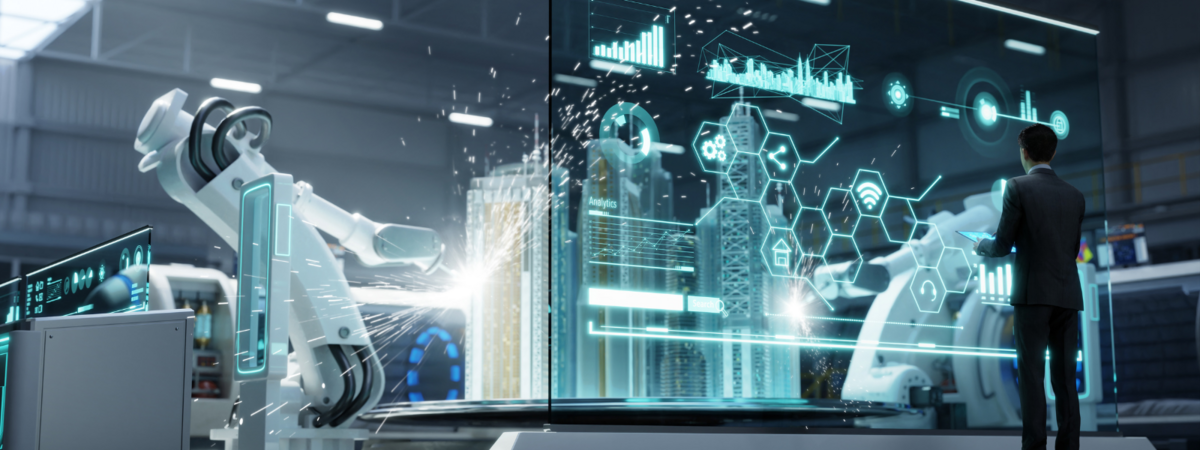Transform Now: Top 5 Benefits of Immediate Digitalization in Manufacturing
2023-12-29
The digital transformation of production is no longer something that companies can delay for later. If you want to remain competitive in today's world and be prepared for the unpredictability of the future, it is essential to start investing in advanced technologies and systems that bring the benefits of automation, improved quality control, and enhanced customer service.

However, some manufacturing companies are still hesitant to depart from traditional working methods due to the initial capital cost reduction. Yet, the long-term profits and operational sustainability associated with digital transformation far outweigh any short-term cost savings.
Here is 5 Reasons why you shouldn't postpone the digitalization of your shopfloor.
Reason no. 1: Improvement in Manufacturing Productivity and Operational Efficiency
The manufacturing industry is constantly evolving, increasing its demands for efficiency and productivity. In the current era of digitalization, it's necessary to utilize technologies like IoT or digital twins that help address these challenges by:
- Automating tasks
- Streamlining processes
- Eliminating manual work
Task automation stands as one of the most effective ways to minimize human errors that could slow down production. Leveraging modern technologies such as artificial intelligence, machine learning, or advanced robotic solutions can significantly reduce errors and enhance the precision of manufacturing processes. These solutions can also operate processes 24/7, ensuring uninterrupted production.
Streamlining processes through digital transformation represents another significant advantage. Manufacturing processes are often needlessly complex or prolonged due to manual or outdated, inefficient systems. Utilizing advanced production management software such as MES (Manufacturing Execution System) or ERP (Enterprise Resource Planning) systems can simplify and optimize operational processes, remove redundant operations, and accelerate the overall production cycle.
Equally important is the elimination of manual labour. Manual work is not only time-consuming but is often associated with higher costs. By implementing intelligent manufacturing technologies and robotics, you can significantly reduce the need for manual labour, leading to cost reduction and increased overall production speed.
By implementing these procedures, you'll create an efficient and safe working environment that maximizes its resources. However, it's important to note that digital transformation in manufacturing isn't just about technology - it's a comprehensive process involving changes in:
- Corporate culture
- Processes
- Business models
- And people
All these aspects must be considered in planning and developing digital transformation in manufacturing.
Reason no. 2: Quicker Operational Insight
In the digital era, data has become one of the most valuable assets for every company. But what about manufacturing companies?
Real-time data provides significant benefits in the decision-making process. They can offer precise and current information about manufacturing processes, production efficiency, equipment performance, inventory status, and many other operational aspects. These data enable more informed decisions based on factual information rather than estimations or judgments.
One of the technologies enabling real-time data collection and analysis is the MES system. This system consolidates and processes data from various sources in production, providing managers with a detailed overview of their operations.
Data can be used not only to monitor the current state of production but also to identify areas that require improvement. With this knowledge, managers can modify strategies more swiftly, thereby enhancing overall efficiency and productivity.
Access to real-time data also allows better measurement of progress toward set objectives. Companies thus acquire a robust tool for monitoring and measuring their results, which is essential for successful business operations in today's competitive environment.

Reason no. 3: Increased Accuracy
We increasingly rely on automation to achieve high precision and efficiency. Automation is a key tool that can help eliminate the risk of human error, improve accuracy, and increase production speed.
Process automation isn't just about replacing human labour with machines. It involves integrating advanced technologies into manufacturing and supply procedures to increase their efficiency and optimize costs. These technologies include, for instance, MES systems for production management that automate:
- Work planning and scheduling
- Monitoring and controlling manufacturing procedures
Automation also brings significant benefits in data processing and analysis. Automated systems can process vast amounts of data in a short time and provide precise information necessary for decision-making. These data can unveil potential issues before they become severe and help eliminate errors caused by incorrect inputs or assumptions.
However, it's crucial to emphasize that automation is not a simple process and requires proper planning and implementation. Correct setup and coordination of automated systems are key to their effective utilization.
Reason no. 4: Enhanced Customer Experience
Digital transformation opens doors to a new era of customer experiences. Today, customers expect high-quality products delivered quickly and reliably, precisely what digitalization enables.
Digital transformation and the implementation of MES systems for production management allow faster and more efficient manufacturing processes. These systems streamline planning, monitoring, and control of production processes, leading to expanded production capacity and shorter delivery times.
Regarding communication with customers, digital channels like social media, emails, chats, and webinars enable businesses to better understand customer needs. This instant and transparent communication allows companies to respond to customer feedback in real-time and adapt to their changing needs.
Reason no. 5: Increase of Security
In an era where we increasingly rely on digital technologies, ensuring the constant protection of our digital assets and data is crucial. Safeguarding sensitive information and protection against cyber threats are key priorities of digital transformation.
The development of digital transformation means a shift from manually kept records to digital, allowing the use of sophisticated encryption systems to protect data. These encryption methods transform readable data into an unreadable code without the key, significantly reducing the risk of information leakage.
Multi-factor authentication processes provide an additional level of protection, preventing unauthorized access to systems and data. These methods might include a combination of something a user knows (password), something they have (a mobile phone for receiving SMS codes), or something unique to them (biometric data like a fingerprint).
Regular security checks and updates are necessary to ensure that all systems are current and protected against the latest threats. Cyber threats are dynamic and constantly changing, so it's essential for security to always be at the forefront of innovation.
Investing in specialized technologies and software for cybersecurity is a necessary step. This can include:
- advanced threat detection systems,
- endpoint cybersecurity solutions,
- and network monitoring.

However, there are more reasons why not to postpone digital transformation in manufacturing operations.
Reason no. 6: Competitive Advantage
Rapid technological advancements mean that companies that do not adapt risk losing their competitive edge. Digital transformation allows companies to stay ahead of the competition, innovate faster, and adapt to market changes with greater flexibility.
Reason no. 7: Scalability
Digital solutions are much easier to scale compared to traditional methods. As your business grows, digital systems can seamlessly absorb this growth without the need for significant changes in IT infrastructure.
Reason no. 8: Real-time Predictions
Digital transformation enables real-time prediction monitoring, allowing businesses to monitor and adjust their operations instantly as needed. This capability can significantly enhance decision-making processes, enable more efficient resource allocation, and faster reactions to emerging issues.
Reason no. 9: Environmental Sustainability
Digital transformation can help reduce a company's carbon footprint by optimizing resource usage and waste elimination. Intelligent manufacturing systems like MES systems aid in reducing energy consumption by optimizing production plans to minimize machine idle time and through integrated energy management.
Reason no. 10: Improvement in Employee Satisfaction
Digital tools can automate repetitive tasks, freeing up employees to focus on strategic and more fulfilling responsibilities. This change can lead to higher job satisfaction, better employee retention, a more positive corporate culture, and a safer working environment.
Need help with digitizing your production? Our experienced smart industry consultants and analysts are ready to advise you on elevating your operations to a higher performance level. Contact our smart industry team.







